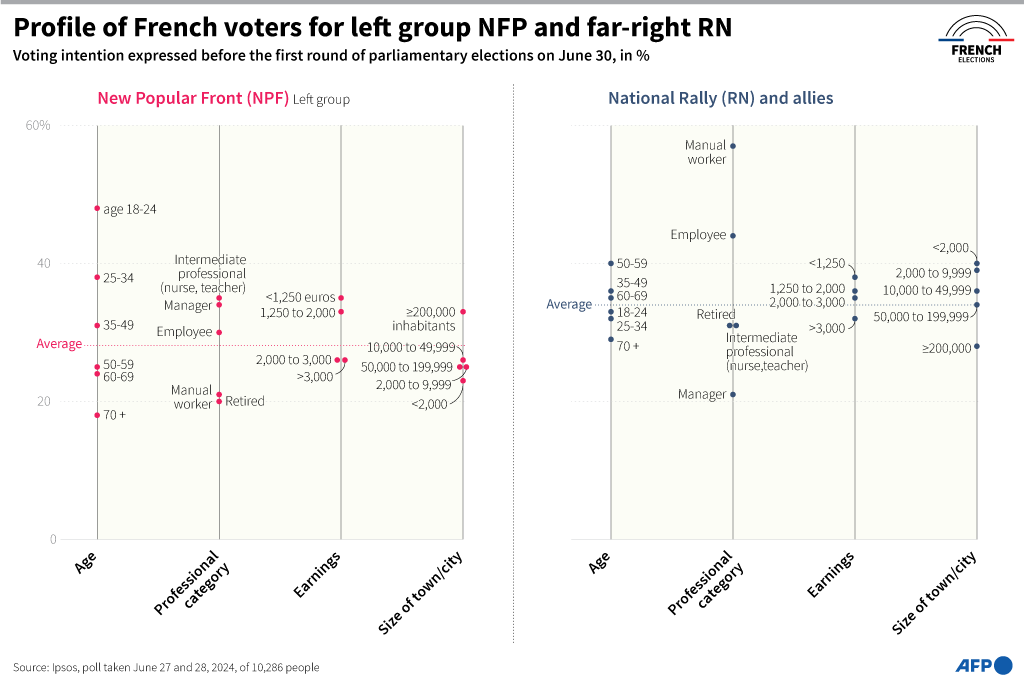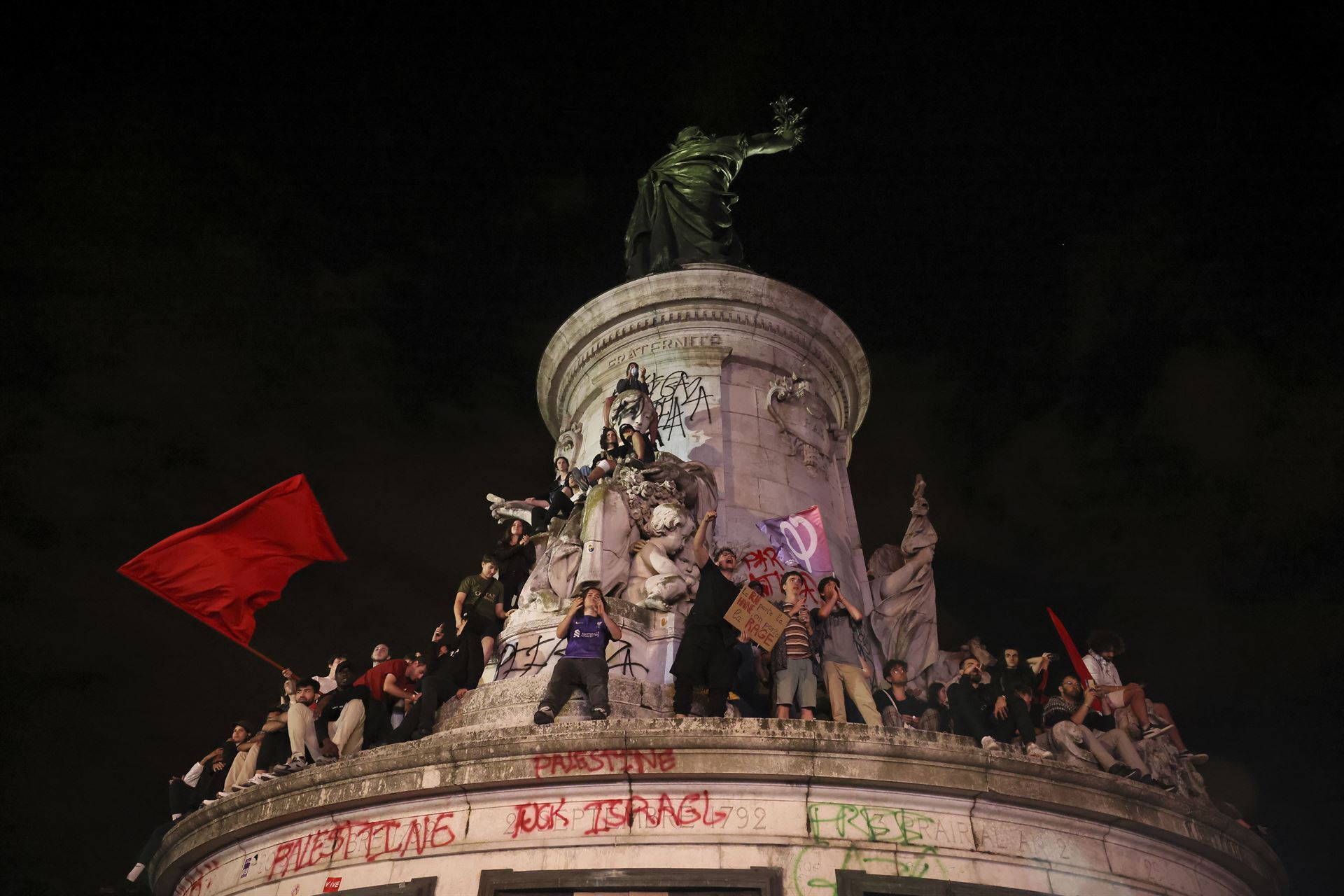
PARIS - Opponents of France's far right sought to build a united front to block the path to government of Marine Le Pen's National Rally (RN) on Monday, after the party made historic gains to win the first round of a parliamentary election.
ALSO READ: France votes in election that could hand power to far right
The RN and its allies won Sunday's round with 33 percent of the vote, followed by a left-wing bloc with 28 percent and well ahead of President Emmanuel Macron's broad alliance of centrists, who scored just 22 percent, official results showed.
I don't think people realize what's happening, they are only thinking of the cost of living and short-term things like that... I find it very sad.
Yamina Addou, A resident (left-leaning)
While financial markets rallied on relief the RN tally was not greater, it was still a huge setback for Macron, who had called the snap election after his ticket was trounced by the RN in the European Parliament election last month.
READ MORE: French election: National Rally seen winning 37% of popular vote
"I'm satisfied, because we need change," said RN supporter Jean-Claude Gaillet, 64, in Le Pen's northern stronghold of Henin-Beaumont. "Things have not moved, and they must move."
But others feared the rise of the RN and its nationalist platform would cause growing tensions in French society.
"I don't think people realize what's happening, they are only thinking of the cost of living and short-term things like that," said Yamina Addou outside a supermarket in the nearby town of Oignies, south of Lille. "I find it very sad."
Whether the anti-immigrant, eurosceptic RN can form a government will depend now on how successfully other parties manage to thwart Le Pen by rallying round best-placed rival candidates in hundreds of constituencies across France.

The RN would need at least 289 seats in parliament for a majority. Pollsters calculated the first round had put it on track for anything between 250-300 seats - but that is before tactical withdrawals reshape voter intentions next weekend.
'Attack!'
Leaders of both the left-wing New Popular Front and Macron's centrist alliance indicated on Sunday night they would withdraw their own candidates in districts where another candidate was better placed to beat the RN in next Sunday's run-off.
A longtime pariah for many in France, the RN (far right) is now closer to power than it has ever been. Le Pen has sought to clean up the image of a party known for racism and antisemitism, a tactic that has worked amid voter anger at Macron, who is seen by many voters as out of touch with their everyday concerns
It was not initially clear whether such a pact would always apply if the left-wing candidate was from the far-left France Unbowed (LFI) party of Jean-Luc Melenchon, a divisive figure with radical tax-and-spend proposals and class war rhetoric.
READ MORE: France saw a rise in all types of racism in 2023, report says
But Macron told ministers on Monday that denying the RN a majority was the top priority, according to one source at a closed-door meeting who said this was intended to confirm that the pact could apply to LFI candidates on a case-by-case basis.
The source said Macron ended his speech at the Elysee Palace meeting with the call: "Attack!"
Pollster Ipsos calculated the first round had left three-way contests in around 300 of the 577 seats in France's National Assembly. Le Monde newspaper said third-placed candidates had already withdrawn in around 160 of those.

While the so-called "republican front" against the far-right has broadly worked in the past, analysts question whether French voters are still ready to cast second-round ballots as directed by political leaders.
A longtime pariah for many in France, the RN is now closer to power than it has ever been. Le Pen has sought to clean up the image of a party known for racism and antisemitism, a tactic that has worked amid voter anger at Macron, who is seen by many voters as out of touch with their everyday concerns.
READ MORE: France faces risk of violence due to snap election, interior minister says
The RN gains were welcomed by nationalists and far-right groups across Europe, including Italy's Prime Minister Giorgia Meloni and Spain's Vox party. Pedro Sanchez, Spain's Socialist premier, said left-leaning parties could still block an outright RN victory.
German Foreign Minister Annalena Baerbock signaled concern at the rise of "a party that sees Europe as the problem and not the solution" and drew parallels to the growing support for the far-right Alternative for Germany (AfD) in her country.
An RN-led government would raise major questions over where the European Union was headed. Human rights groups have raised concerns about how its "France first" policies would apply to ethnic minorities, while economists question whether its hefty spending plans are fully funded.

Hung parliament?
Banking shares led a surge by French stocks and the premium investors demand for holding the country's bonds dropped, while the euro rose, on Monday on market relief the RN had not done better.
The main alternative scenario to an RN-led government would be a hung parliament potentially making France ungovernable for the remainder of Macron's presidency due to run until 2027.
In constituencies with no outright winner, the top two candidates, plus any candidate with more than 12.5 percent of registered voters in that constituency, have until Tuesday evening to confirm whether they will go into the second.
READ MORE: Demonstrators across France protest against far-right
In the manoeuvring after the vote, Prime Minister Gabriel Attal suspended unemployment reform plans which would have reduced jobseekers' benefits - a move that may make it easier for left-wing voters to back Macron allies.
RN lawmakers meanwhile urged center-right politicians in the Republicans (LR) party, which received less than 7 percent of the first-round vote, to withdraw from districts where such a move would work in RN's favor.
The LR, which split ahead of the vote with a small number of its lawmakers joining the RN, has yet to clarify its stance.
Jordan Bardella, the RN's choice of prime minister if it wins a majority, focused his attacks on left-wing parties, describing the far-left as "an existential threat" to France.


